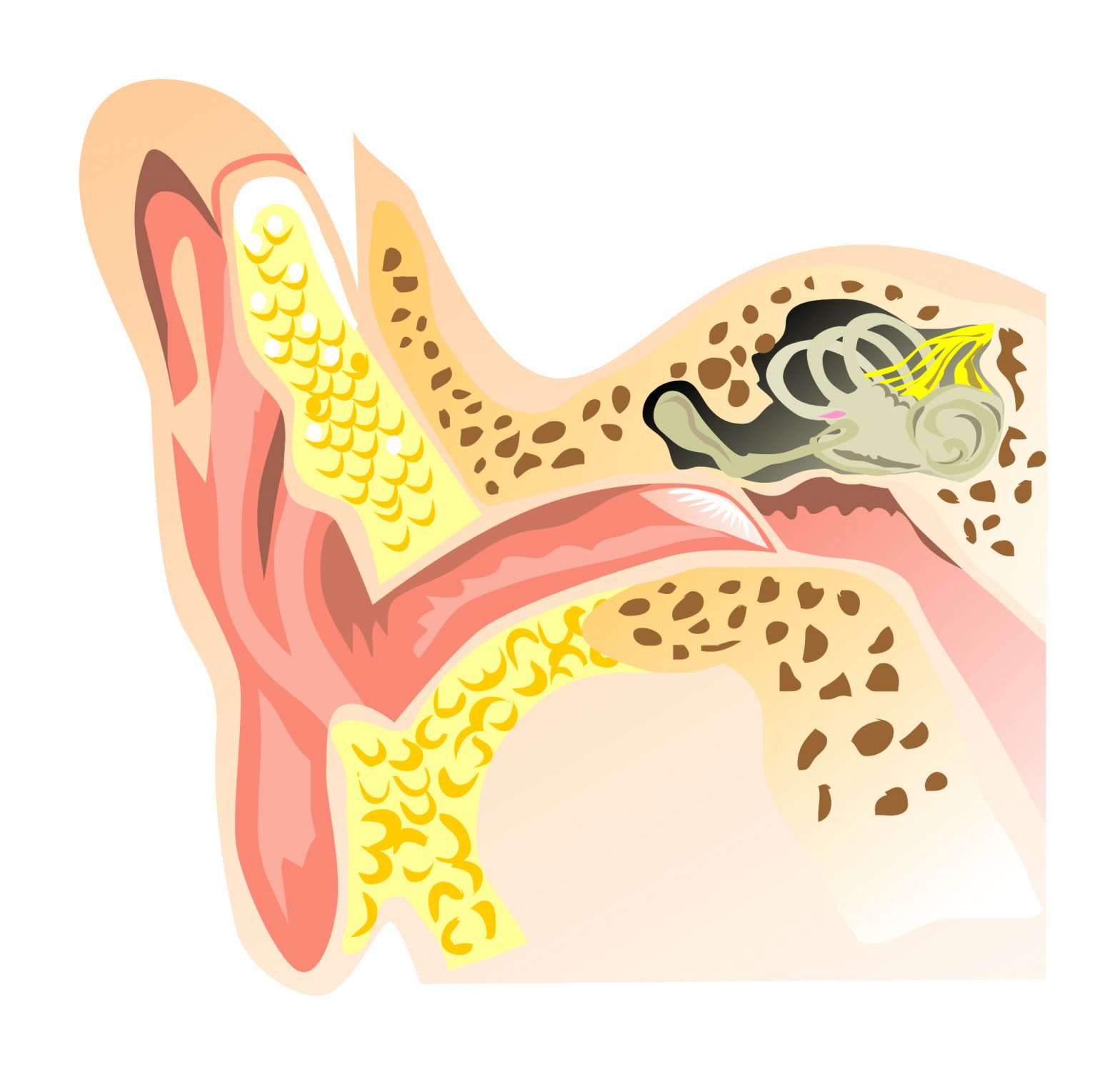Hearing Health Check – What is Tinnitus and How is it Treated?
Tinnitus is any sound you hear when there isn’t any physical external noise present. In other words, you hear it internally (in your head) and in most cases no one else can hear it. It’s important to remember that tinnitus is a symptom and not an actual disease itself, so it cannot be treated directly. The underlying cause of the tinnitus has to be discovered first before any treatment can be tried.
What does tinnitus mean?
Tinnitus means “tinkling or ringing like a bell” and has a Latin origin. People describe the sound in different ways. The most common is a high pitched continuous whine, buzz or ringing. Other descriptions are clicking, chirping, whistling, hissing and whooshing. While most tinnitus is higher in pitch, others have described them as lower pitched humming, rumbling or droning.
I have even had a few patients come in and state: “I know this sounds crazy…” when they describe their tinnitus as a favourite song or piece of music. I have to assure them they are not losing their mind and that while this type of tinnitus is rare, it has been documented.
While tinnitus is not fully understood, we know that it is real and that it’s a symptom of something that is going wrong within your hearing system.
One of the simplest causes of tinnitus is having wax in touch with your eardrum. Having the wax removed can stop the tinnitus.
While wax is generated by everyone to some degree, the wax actually is created away from your eardrum. By the very nature of the way the ear canal is designed (it slopes down and away from the eardrum) most wax will flow out of the ear on its own. However, a lot of people use Q-tips incorrectly and actually push the wax further and further into the ear, eventually causing it to touch the very sensitive eardrum.
Types of tinnitus
One type of tinnitus, called pulsatile tinnitus, is heard in conjunction with your heart beat and caused by fatty deposits in the blood vessels near your ear, causing a restricted and therefore “noisy” blood flow. This is one form of tinnitus that may actually be heard by someone else if they are close enough to your ear. The blockage is close to the surface of the skin and it is noisy enough. The vast majority of pulsatile tinnitus is caused by a much more common reason which I will discuss later.
Certain medications like aspirin can cause tinnitus. A recent change in medication, followed by the onset of the tinnitus, can help your family physician narrow down and possibly offer an alternative to the medication you are currently taking. As always, never stop or change the dose of your medications without consulting your prescribing physician.
A small percentage of tinnitus occurs when your jaw muscle spasms. The temporo-mandibular joint in your jaw is connected to a muscle in the middle ear and when the joint spasms it contracts the muscle in the middle ear, which pulls on your ear drum. This causes what is mostly described as a clicking sound. A visit to your dentist is in order as this can be treated. The old childhood rhyme, “the jaw bone is connected to the (fill in the blank) bone…in this case it’s the ear bone!
Some other causes of tinnitus are much more serious. Meniere’s disease is often accompanied by a “roaring” tinnitus and can cause a major hearing loss along with severe dizziness (to the point of vomiting and being unable to stand).
Certain types of tumours can cause tinnitus. They grow near and put pressure on the nerves that send sound to the brain. Usually the serious causes of tinnitus only occur on one side. If you have tinnitus on just one side then you should definitely consult your physician. Do not assume the worse in case of tinnitus on one side, it may just be wax. Your physician may refer you to an otolaryngologist (ear, nose and throat specialist) if he or she doesn’t see an apparent cause of the one sided tinnitus.
While not every person with tinnitus has a hearing loss, the majority of people with hearing loss do have some sort of tinnitus. Patients come in on the mistaken belief that the tinnitus is blocking them from hearing when in actual fact it is a by-product of a hearing loss.
When fitted with properly programmed hearing aids, fine-tuned to their specific loss, a lot of patients report that their tinnitus turns off for a while, even after they have taken them off. This allows them to get to sleep at night. However, when not wearing the aids for an extended period the tinnitus always comes back.
Theories behind tinnitus
One of the most commonly accepted theories is that we all have internal noises going on in our body. When our hearing is normal all the external sounds around you are enough to cover your internal noises. But as soon as a hearing loss occurs that ambient noise is no longer there to cover these sounds. So the pulsatile tinnitus referred to earlier may not be caused by a blockage in the arteries, it just is no longer being covered up by the everyday background sounds.
This explains why most people find the tinnitus much louder when things are quiet, but doesn’t explain why the tinnitus goes away for a period of time after hearing aids are taken off and it doesn’t explain musical tinnitus.
Another theory (the one I tend to lean to) is that the brain has been receiving a certain amount of sound stimulus 24 hours a day, every day for your whole life and when a hearing loss occurs it notices this lack of stimulation and produces its own to compensate.
This explains why the pitch of the tinnitus is usually very close to the pitch with the most amount of hearing loss and this also explains musical tinnitus quite nicely.
When wearing aids for an extended period it has been suggested the brain doesn’t notice the lack of stimulation for some time after taking the aids off. This explains why there is a delay in the tinnitus coming back.
Those without a hearing loss are usually advised to try and ignore the sounds and to avoid quiet places. There are also products called tinnitus maskers, which are worn like a hearing aid and provide a variety of sounds from white noise to fractal music.
These sounds are usually set to just below the perceived volume level of the tinnitus, which gives just enough stimulation to the brain for it to turn the tinnitus off. Quite a few hearing aids now come with tinnitus masker programs built in, so they can be used as a hearing aid, a tinnitus masker or both at the same time.
In certain cases some people fixate on their tinnitus and need therapy to get it under control. There is a program created for these people called Tinnitus Retraining Therapy, which uses therapeutic techniques, sometimes in conjunction with tinnitus maskers, to help these people put their tinnitus back in perspective.
Measuring how loud people hear their tinnitus
I have measured, in my clinic, how loud people “hear” their tinnitus. I will first find the closest pitch at which the tinnitus is perceived and will put the tone into the person’s ear and keep raising the volume of the tone until they tell me they can no longer hear the tinnitus.
People are very surprised when I tell them they are “hearing” the tinnitus at somewhere between 3-5 decibels. Barely a whisper! “Why does it sound so loud?” is the common question afterwards.
It really is the “perception” of loudness and how focused you are on sounds. Picture yourself at the mall on a nice sunny morning and you are walking to your car after doing some early shopping. You go to the parking garage and there are several other people walking to their cars as well. Now picture yourself on another occasion where you finished shopping, but just as the stores were closing. It is now 10pm and you go out to the parking garage. There is only one other person there but you can’t see them, but you definitely hear the loud click-clack of someone walking in your general direction. You probably didn’t even notice the sounds of many people walking in the morning, but you sure hear it as clear as a bell in this situation.
It would be easy to tell the person at night just to ignore the sounds, but most would find it difficult to actually do. In this case the sound is perceived to be louder because the person feels some anxiety that they may be in danger and concentrates harder on the sound.
This may also come to play with tinnitus. The danger the person in the parking garage feels could very well be real and can quite rationally be derived by our “intellectual” brain. But we also have a “primitive” brain that mostly works on instinct (i.e. to automatically cry when we are infants when we are hungry).
There is a theory that the “primitive” brain goes on high alert when hearing the tinnitus and causes the unfortunate person to concentrate on it obsessively.
So there you are. Tinnitus is a symptom and not a disease that can be treated directly. Most tinnitus is a side effect of a hearing loss (the other part is caused by a malfunction in the hearing system, not necessarily a loss).
As far as I know, herbal medicines (or any type of medicine for that matter) have not been shown to conclusively stop tinnitus.
Tinnitus Retraining Therapy, tinnitus maskers and properly programmed hearing aids can alleviate and sometimes stop tinnitus for a while. Certain causes, like wax on the eardrum, can be removed or medicines can be changed to stop the tinnitus from recurring.
Don’t be surprised if your family physician refers you for a hearing test if you come in complaining of tinnitus. It’s their subtle way of telling you, after assessing your particular situation, that you probably have a hearing loss and in most cases require some sort of amplification.
Tinnitus doesn’t “block” you from hearing properly. It’s there because you are not hearing properly!
Ned Radenovic is a Hearing Instrument Specialist registered with AHIP and he sees patients at our Hearing Solutions in Oakville Place







